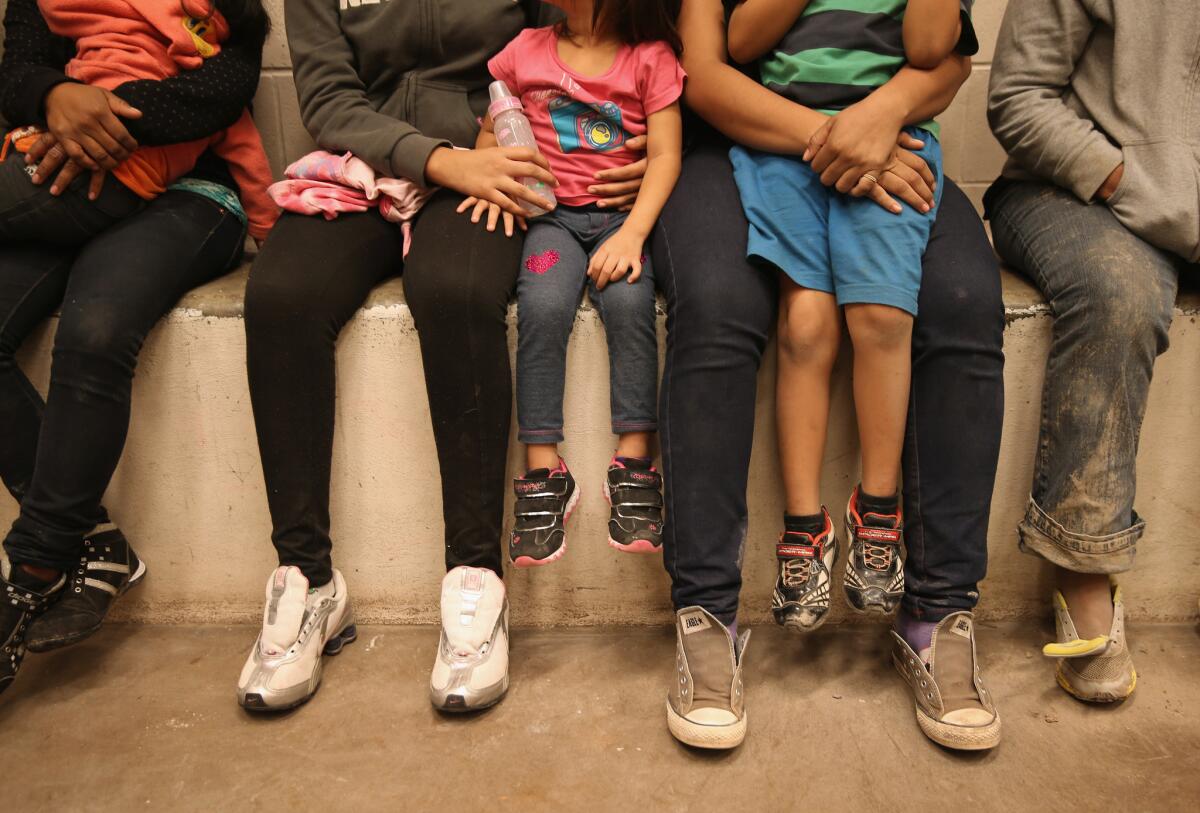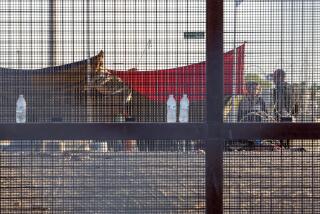U.S. policy change may enable speedy release of detained immigrant families

Women and children sit in a holding cell at a U.S. Border Patrol processing center after being detained by agents near McAllen, Texas, in September.
Hundreds of women and children in immigration detention will have a chance to go free on bond if they can prove they are eligible for asylum or other immigration relief under a new policy the Department of Homeland Security announced Wednesday.
“I have reached the conclusion that we must make substantial changes in our detention practices with respect to families with children,” Homeland Security Secretary Jeh Johnson said in a written statement. “In short, once a family has established eligibility for asylum or other relief under our laws, long-term detention is an inefficient use of our resources and should be discontinued.”
An increase in women and children crossing the Southwest border last year overwhelmed immigration officials. Last fiscal year, more than 68,000 people were apprehended in the border area and detained while officials decided whether they had a right to stay. Initially, many were released with orders to appear, because there weren’t appropriate facilities to house families. Then the Obama administration opened detention centers for mothers and children.
Johnson’s move follows an outcry over family immigration detention and reports of poor conditions, abuses and attempted suicides in three detention centers.
The announcement came days after House Democrats toured two Texas detention centers and penned a letter to Johnson, calling for an end to family detention.
The change did little to satisfy critics of the administration’s immigration policies, however.
Democratic lawmakers, who sent the letter to Johnson, called the revision “inadequate.” A contingent of immigrant rights activists, who have long complained that families are being held for long periods and in questionable conditions, also said the changes didn’t go far enough.
“I think the bottom line is that we should not have immigration jails for families. As a country, we should not be locking up children,” said Cecillia D. Wang, director of the American Civil Liberties Union Immigrants’ Rights Project.
Foes of President Obama’s immigration policies also decried Johnson’s move.
“Today’s announcement ... only encourages more children and families to make the dangerous journey to the United States,” House Judiciary Committee Chairman Robert W. Goodlatte (R-Va.) said in a statement. “The best way to deter illegal immigration is to enforce our laws in the interior of the United States and detain those who illegally cross our borders while their cases are pending. However, the Obama administration refuses to take the actions necessary to end the crisis at our southern border and instead continues to take steps in the opposite direction that only encourage more to come.”
The crisis began last year, when a wave of mostly Central American families and children crossed the Southwest border, attempting to flee crushing poverty and escalating gang violence. The exodus was also partly fueled by rumors in their home countries that unaccompanied children and single parents with at least one child would be allowed to stay.
Some people who crossed were apprehended, while others surrendered to border enforcement officials and requested asylum, which is within their rights under U.S. and international laws.
In response, the Obama administration expanded detention centers for families, and the court system — already grappling with a backlog of cases — became even more bogged down. Hundreds have been ordered removed, some have been released, and more than 1,300 mothers and children are still detained at two Texas facilities — one in Dilley, another in Karnes City, both run by private companies under contract with Immigration and Customs Enforcement. A third, in Berks County, Pa., is run by the county.
The number of apprehended immigrants is down this year, but the immigration court backlog persists.
Michelle Brane, director of the Migrant Rights and Justice program at the Women’s Refugee Commission, said Johnson’s new policy was a good first step, but implementation is the key.
“It’s one thing to say you are going to start releasing these families. We have to actually see it happening,” Brane said.
Several questions remain, said Antonio M. Ginatta, advocacy director for the U.S. Program at Human Rights Watch.
“How long will the families be in detention? What will be the bond rate?” Ginatta said. “We are cautiously encouraged. I think this is the first step. We’re glad to see that DHS is finally coming to its senses.”
Ginatta said his organization wanted all families to be released from these facilities because detention has been shown to cause physical and mental trauma, especially to children. He and other immigrant rights activists say there are more humane ways to keep track of families and still give them liberty pending a decision on whether they can stay in the U.S. In-person check-ins and ankle bracelets are some alternatives, he said.
Mohammad Abdollahi, advocacy director for San Antonio-based Raices, an immigrant legal advocacy group, accused the administration of making Wednesday’s announcement to buy time.
“What does this actually mean for families?” he said. It can take up to five weeks for an immigrant seeking asylum to be interviewed by officials, he said, and an additional week or two for a decision on whether she has a reasonable or credible fear of returning to her home country.
“It’s not good enough to say we’re keeping traumatized people in a space where we’ve had two suicide attempts in two months,” Abdollahi said, referring to two Central American women who activists say tried to take their lives while in detention. “The only time they have changed family detention is when lawsuits force them.”
Times staff writers Michael Muskal in Los Angeles and Molly Hennessy-Fiske in Dilley contributed to this report.
More to Read
Start your day right
Sign up for Essential California for news, features and recommendations from the L.A. Times and beyond in your inbox six days a week.
You may occasionally receive promotional content from the Los Angeles Times.







